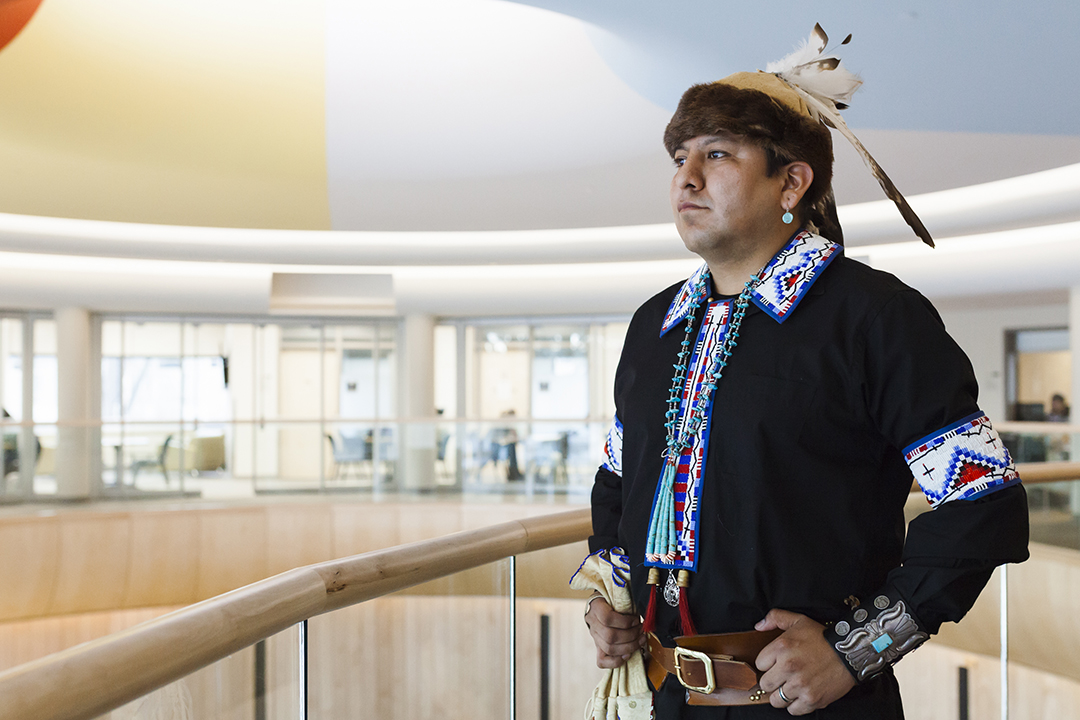
T.J. Warren’s successes are firmly planted in his Diné roots
This week the University of Saskatchewan is celebrating the successes and contributions of Métis, First Nations and Inuit students, staff and faculty through Indigenous Achievement Week.
By John ShellingThe festivities include artistic performances, speakers’ panels and lectures in various locations across campus.
Each year, there is an awards ceremony to honour Indigenous students and to recognize their academic accomplishments, leadership, research endeavours or community volunteerism.
One of the award winners this year is T.J. Warren—a student in the College of Education—who is receiving an award for his exemplary leadership.
Warren grew up in Red Mesa, Arizona, and is a proud member of the great Diné Nation. A natural leader and cultural advocate, he is often found volunteering with youth, sharing his gift of song and dance. Warren was instrumental in working with the university to rethink its position on charging international student fees for Native American students from the United States. He is an active participant in the Indian Teacher Education Program community.
We caught up with Warren to ask him a few questions about what motivates him.
When we took your photo, you said it was important for people to see you in your regalia. Why is that important to you?
Because this how I want the world to see me—a proud Diné. There is nothing more beautiful than a person who knows who they are and where they come from, and who they represent. When I walk in the outside world, I carry so much with me, my people have fought to have the right to be here. Education was never meant to be a place for an Indigenous person to be successful and continue to be who they are. I choose to retain a strong traditional foundation and identity in my educational endeavour in lieu of assimilating into the mainstream university culture. Because of every prayer that was said for me, every word of encouragement given, every sacrifice I made, I earned the right to be seen however I want. I will always be Diné first and foremost, and that is how I want to be seen.
You received the award for leadership. Can you talk about one person in your life you think is a good leader and what makes them so?
I can’t think of just one, so I would like to say my mother and father. Growing up, the work ethic and the guidance role modeled by my parents taught me how to be successful with the concept of T’àà hwí’ájítéego: "it is up to you". We were also guided by the moral and behavioural teachings of Hózhó, which is a state of well-being and balance. Every day we we’re encouraged to strive for Hózhó, to be a good leader, to be self-empowered through our thoughts, actions, behaviors, and words. I think a great leader needs all of these teachings and qualities, which I learned through my traditional upbringing as a Diné.
What are your plans for the future?
I will continue to do my part in the resurgence of language, culture and identity. I want to create an environment for all people to be successful. My children will also be a part of this new movement of great Indigenous leaders of the future. Ultimately, I want to create what I want to be available for my children. I will continue to use my traditional teachings as a foundation to my teaching philosophy and approach to education. I also hope to be a part of an Indigenous academy in the future one day that is guided by our elders and own principals and foundations as Indigenous people.
What advice would you give a young Indigenous person from Arizona thinking of moving to Saskatchewan to attend the school at the U of S?
I would say consider the Indian Teachers Education Program at the U of S. Come and be a part of a great program to help you understand the importance of Indigenous knowledge and its ability to change education for the better.
This interview has been edited and condensed.
To learn more about the events that are taking place this week, be sure to check out the Indigenous Achievement Week website.

